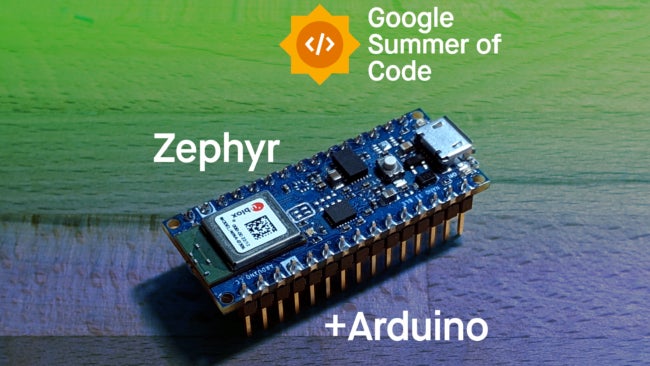Written by Mike Szczys, a Zephyr Ambassador and Developer Relations Engineer at Golioth

This blog originally ran on the Golioth website. For more content like this, click here.
The Arduino ecosystem is ever-growing, and thanks to the excellent work of Dhruva Gole it’s coming to Zephyr as well.
For the 2022 Google Summer of Code with Golioth, Dhruva took on the challenge integrating the Arduino core with Zephyr RTOS as the base. Now the program is nearing completion and we’ve been excitedly building and running Arduino sketches that can directly call Zephyr libraries and subsystems. And of course, the cross-platform nature of Zephyr means there are suddenly many more boards that can run that Arduino code.
What is GSoC
Google Summer of Code is a program that focuses on bringing new contributions to Open Source. The program matches up participants (often students but not necessarily) with mentors to work on a specific goal previously accepted by the GSoC program.
Dhruva Gole finished his Bachelor of Technology in Electrical Engineering earlier this year. He has been working throughout the summer to build a Zephyr module that includes the Arduino core. This is the second GSoC program for Dhruva, who in 2021 worked on bringing Bela support to the BeagleBone AI platform. We’re also very happy to share the news that Dhruva began a job with Texas Instruments last month, congratulations!
It has been wonderful working with Dhruva, who has made a sizable contribution to the open source ecosystems of Zephyr and Arduino. At the same, as mentors we have been able to share a glimpse of how the Golioth engineering team operates. Finding our way through some hairy issues with the I2C system, mapping the Zephry Arduino header paradigm in DeviceTree, and getting the build system to work without extra command line arguments provided a great opportunity to work collectively.
What has been accomplished
Zephyr is a Real-Time Operating System (RTOS) that focuses on abstracting hardware functions so that the same code may be run on innumerable hardware platforms. This is an excellent underpinning for the Arduino code.
When successfully combined, Arduino sketches can be run on hardware that does not have an Arduino port. And at the same time, Zephyr features like multi-threading and the network stack become available to those Arduino sketches.
The milestones reached in the project thus far include:
- Arduino Digital GPIO functions (e.g.: pinmode, digitalRead, digitalWrite)
- Arduino time functions (e.g.: delay, millis)
- I2C support via the Wire library API (works with external Arduino libraries)
- A DeviceTree framework for mapping Arduino header pins to any Zephyr boards
- Serial.println support in progress
How to use it
The project is organized as a Zephyr Module called Arduino-Zephyr-API. Any board that has Zephyr support can be defined in the variants directory of this module. This is accomplished by adding a DeviceTree overlay file (to map the pins of the board to the pin numbers from the Arduino ecosystem) and a pinmap header file which wraps Zephyr pin functions with the familiar Arduino API calls.
Using west, the Zephyr meta tool, Arduino sketches can be compiled and flashed to your target board. Beyond core functions, the addition of an RTOS opens up the ability to use multiple threads in Arduino. Dhruva has includes an excellent threading demonstration by blinking multiple LEDs asynchronously.
Rudimentary instructions for adding the module to your Zephyr installation are available in the project README. Documentation for adding boards is currently in progress and will be complete by the end of the GSoC program in September.
Challenges for future contributors
The heavy lifting of integrating the Arduino core with Zephyr has already been completed and is working well. But to use this, you must already have a Zephyr workspace installed (and know how to use it). Sure, Golioth has a quickstart that helps install Zephyr, but the ability to use this project from the Arduino IDE is desirable for existing Arduino users.
Unfortunately, there isn’t time left to work this level of integration. But contributions to the program are welcome and we hope that future contributors will take on this task.
There is also low-hanging fruit when it comes to implementing the most-used Arduino functions. For instance, random numbers, bits and bytes, and math functions should all be trivial to get working. More ambitious contributors may consider mapping the Zephyr ADC system to analogRead() and analogWrite().